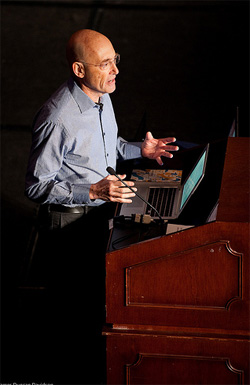Publishing Talks: David Wilk interviews Mike Shatzkin
February 28, 2011 by David
Filed under Ebooks and Digital Publishing, Publishing History, PublishingTalks, Technology, The Future
 In this series of interviews, called Publishing Talks, I have been talking to book industry professionals and other smart people about the future of publishing, books, and culture. This is a period of disruption and change for all media businesses. We must wonder now, how will publishing evolve as our culture is affected by technology, climate change, population density, and the ebb and flow of civilization and economics?
In this series of interviews, called Publishing Talks, I have been talking to book industry professionals and other smart people about the future of publishing, books, and culture. This is a period of disruption and change for all media businesses. We must wonder now, how will publishing evolve as our culture is affected by technology, climate change, population density, and the ebb and flow of civilization and economics?
I hope these Publishing Talks conversations can help us understand the outlines of what is happening in the publishing industry, and how we might ourselves interact with and influence the future of publishing as it unfolds.
These interviews give people in and around the book business a chance to talk openly about ideas and concerns that are often only talked about “around the water cooler,” at industry conventions and events, and in emails between friends and they give people inside and outside the book industry a chance to hear first hand some of the most interesting and challenging thoughts, ideas and concepts being discussed by people in the book business.
Mike Shatzkin, is the founder and operator of a well known book industry consulting business called The Idea Logical Company. He’s also a blogger extraordinaire who writes incisively about issues in the book industry at The Shatzkin Files and who is never afraid to make public predictions about the future of books and the book business he knows so well, having essentially grown up in the business from an early age. He is an organizer of conferences, and a frequent speaker at publishing industry gatherings large and small.
The description of Idea Logical on its website sums up Mike’s role pretty succinctly: “The Idea Logical Company consults to book publishers and their trading partners about the changes engendered by digital transformation to every component of the value chain.” Mike has spent thirty years addressing all sorts of issues and problems for publishing and retailing clients of all sizes. In recent years, his work has focused on the changes created for the publishing industry by a variety of new and emerging digital technologies. He was an early advocate of digital publishing, and also established the concept of “verticality” or subject specific publishing as a way to organize publishing around digital technologies.
Beyond his interest and expertise in publishing, Mike is also a writer and an active entrepreneur. In this interview, we did not discuss any of his baseball related writing, editing, publishing and website development – if we had, it’s likely we would have used up all our time talking about our mutually shared passion, a subject in which Mike has also had an entire career simultaneously with his consulting work and constant thinking and analysis about books, publishers, readers and the business that serves them.
In my opinion, Mike talks just as clearly and intelligently, if not more so, than he writes, which given his writing talents, is saying alot. We certainly had a lot of fun in this conversation, which I think will be useful and interesting to anyone interested in the future of books and reading. As Mike says in his latest blog post: “Sometimes, and it would seem quite often these days, the future comes faster than you expected it.”
Podcast: Play in new window | Download
Read All Day
 Nina Sankovitch has been an inspiration for me. From October 2008 to October 2009 she read a book a day and wrote about it (intelligently and cogently) at her website ReadAllDay. Here’s what she says about why she did it: “I began my year in an effort to come to terms with the tragic death of my oldest sister, Anne-Marie, and to find purpose and meaning in my life. I called my year of reading The 365 Project.”
Nina Sankovitch has been an inspiration for me. From October 2008 to October 2009 she read a book a day and wrote about it (intelligently and cogently) at her website ReadAllDay. Here’s what she says about why she did it: “I began my year in an effort to come to terms with the tragic death of my oldest sister, Anne-Marie, and to find purpose and meaning in my life. I called my year of reading The 365 Project.”
I’ve sent her some books to read and she has given me lots of suggestions for books I have read, and in some cases then interviewed authors for Writerscast. We’ve liked some of the same books, but judging from her site, she and I have very different reading interests. Knowing that has helped me choose some new directions, which I think is a great way to keep from falling into a reading rut.
Meanwhile, Nina’s year of reading adventure was discovered and written about by the New York Times and a number of other media outlets, and she even got a book deal. Her book is called Tolstoy and the Magic Chair: My year of magical reading will be published in June by Harper. I certainly plan to read it and interview her about it too. I’m jealous and dumbstruck with admiration for what she has done.
Anyway, the reason I am writing about Nina is because she has launched a redesigned website that I think is worth a visit. She is continuing to read and write reviews about books of all sizes and shapes – not every day of course, but more books than most people can read and write about intelligently. Here’s how she does it:
HOW TO READ All DAY
Always have a book with you.
Read while waiting.
Read while eating.
Read while exercising.
Read before bed.
Read before getting out of bed.
Read instead of updating FB.
Read instead of watching TV.
Read instead of vacuuming.
Read while vacuuming.
Read with a book group.
Read with your kid.
Read with your cat.
Read to your dog.
Read on a schedule.
Always have a book with you.
Thank you Nina!
Publishing Talks: David Wilk interviews Rick Richter
February 2, 2011 by David
Filed under Ebooks and Digital Publishing, PublishingTalks, The Future
 In this series of interviews, called Publishing Talks, I have been talking to book industry professionals and other smart people about the future of publishing, books, and culture. This is a period of disruption and change for all media businesses. We must wonder now, how will publishing evolve as our culture is affected by technology, climate change, population density, and the ebb and flow of civilization and economics?
In this series of interviews, called Publishing Talks, I have been talking to book industry professionals and other smart people about the future of publishing, books, and culture. This is a period of disruption and change for all media businesses. We must wonder now, how will publishing evolve as our culture is affected by technology, climate change, population density, and the ebb and flow of civilization and economics?
I believe these Publishing Talks conversations can help us understand the outlines of what is happening in the publishing industry, and how we might ourselves interact with and influence the future of publishing as it unfolds.
These interviews give people in and around the book business a chance to talk openly about ideas and concerns that are often only talked about “around the water cooler,” at industry conventions and events, and in emails between friends and they give people inside and outside the book industry a chance to hear first hand some of the most interesting and challenging thoughts, ideas and concepts being discussed by people in the book business.
I’ve known Rick Richter for a number of years. He is smart, energetic and incredibly creative. I am told he plays a mean guitar too. He’s unusual in publishing for having been a leader in both sales and editorial, and for being at heart, an innovator and entrepreneur. I have talked to him a number of times over the past couple of years about his thinking and ideas, and have been interested in his new venture, Ruckus Media since it was still a brainstorm generated idea. Unlike many brainstormed ideas, this one has become real, and very quickly too.
Ruckus represents at least one budding trend in publishing for kids – which is to be born digital and to stay that way. Print, ink and paper will be someone else’s job. At a recent Digital Book World presentation, Rick’s signature statement about his new work was this: “books you can play with and games you can read.”
Rick is currently President, CEO, and Chair, Ruckus Media Group. Previous to founding Ruckus, he was President and Publisher of the Simon & Schuster Children’s Division (1996 – 2008). In 1990, Rick co-founded Candlewick Press, the prestigious children’s publisher based in Boston.
“The goal of Ruckus is to combine the most creative minds in children’s media with tremendously exciting new mobile devices. We’ll be satisfied when a mom or dad can hand their phone or tablet to their child without one ounce of guilt, knowing that the experience the child is about to have will entertain them, challenge them, perhaps make them giggle, and be utterly satisfying.” Beginning in May, Rick will be an adjunct professor at the NYU Master of Science Program in Publishing.
Rick and I had a great talk, not just about what he is doing at Ruckus to make change and create a new way of publishing for kids, but also about the future of digital publishing and much more. Ruckus, along with a number of other new digital publishers are in the process of establishing new ways for children to experience books and reading in some very exciting ways. And it looks like they are having alot of fun doing it.
Podcast: Play in new window | Download
Yet another blog?
 Well not really. I’ve been posting author and book industry interviews at Writerscast now for just about two years, and while I like to feel that the work speaks for itself, I’ve often felt the need to share information and news with my (growing) audience. Aside from Twitter, which is lovely but oh-so-brief, there really has been no way for me to talk about matters related to the site and its content here.
Well not really. I’ve been posting author and book industry interviews at Writerscast now for just about two years, and while I like to feel that the work speaks for itself, I’ve often felt the need to share information and news with my (growing) audience. Aside from Twitter, which is lovely but oh-so-brief, there really has been no way for me to talk about matters related to the site and its content here.
By introducing this little section of Writerscast dubbed “Pipeline,” I can let you know when I come across interesting publishing related news, talk about books that may not be among those whose authors I interview, or just tell you when I am going on vacation and won’t be posting new interviews for a few days. I’ll spare you any thought pieces or pontifications about publishing here (saving that for www.booktrix.com.)
In Pipeline I can also tell you about some of the upcoming posts on Writerscast, or other sites I have discovered I think you should know about, information I hope will be helpful to everyone who visits this site.
For example, my next author interview is with Mickey Leigh about his memoir, I Slept with Joey Ramone. My next Publishing Talks interview is with the always interesting Rick Richter, who has founded a new digital publishing company called Ruckus Media. I think you will enjoy both of these talks.
Please feel free to email me, David Wilk, at david@booktrix.com. Your suggestions, comments, complaints, etc. are always welcome. Praise too, if you hear something you really like at Writerscast. I’m always looking for interesting people to interview, so let me know who is out there I should be talking to and how to reach them.
And for those of you, like me, buried in snow, just remember that spring is less than 60 days away!
Publishing Talks: David Wilk interviews Rich Freese
November 22, 2010 by David
Filed under Ebooks and Digital Publishing, PublishingTalks, The Future
 In this series of interviews, called Publishing Talks, I have been talking to book industry professionals and other smart people about the future of publishing, books, and culture. This is a period of disruption and change for all media businesses. We must wonder now, how will publishing evolve as our culture is affected by technology, climate change, population density, and the ebb and flow of civilization and economics?
In this series of interviews, called Publishing Talks, I have been talking to book industry professionals and other smart people about the future of publishing, books, and culture. This is a period of disruption and change for all media businesses. We must wonder now, how will publishing evolve as our culture is affected by technology, climate change, population density, and the ebb and flow of civilization and economics?
I hope these Publishing Talks conversations will help us understand the outlines of what is happening, and how we might ourselves interact with and influence the future of publishing as it unfolds.
These interviews give people in and around the book business a chance to talk openly about ideas and concerns that are often only talked about “around the water cooler,” at industry conventions and events, and in emails between friends and they give people inside and outside the book industry a chance to hear first hand some of the most interesting and challenging thoughts, ideas and concepts being discussed by people in the book business.
Rich Freese is well known in the book business as a successful member of a very small “fraternity” of distribution experts who work in and understand the intricacies of sales, marketing, warehousing, logistics, and balancing customer and client relationships. He has worked in publishing for his entire adult life. He’s a smart, dedicated and forward looking professional. Rich worked for independent publisher distributor National Book Network for a number of years, moved on to run Motorbooks International, a specialist publisher and distributor, then became President of west coast based Publishers Group West, and after a brief stop establishing a distribution division for the printer, Bookmasters, and has now returned to be the President of NBN, which is based in Lanham, Maryland.
Because book distributors stand in the middle of the supply chain, their worldview is often broader than other entities within the book business. Rich’s breadth and depth of experience in publishing and distribution gives him a unique vantage point from which to view and understand the publishing industry. I thought it would be interesting to talk to him broadly about his current perspective on the ongoing changes in the industry, with some special reference to developing e-book distribution models, the particular issues for independent publishers, and the evolution of publishing models. This talk ought to be particularly useful for independent publishers and anyone interested in their future in a chaotic, challenging marketplace for books.
Podcast: Play in new window | Download
Publishing Talks: David Wilk interviews Andrew Steeves
November 11, 2010 by David
Filed under PublishingTalks, Technology, The Future
 In this series of interviews, called Publishing Talks, I have been talking to book industry professionals and other smart people about the future of publishing, books, and culture. This is a period of disruption and change for all media businesses. We must wonder now, how will publishing evolve as our culture is affected by technology, climate change, population density, and the ebb and flow of civilization and economics?
In this series of interviews, called Publishing Talks, I have been talking to book industry professionals and other smart people about the future of publishing, books, and culture. This is a period of disruption and change for all media businesses. We must wonder now, how will publishing evolve as our culture is affected by technology, climate change, population density, and the ebb and flow of civilization and economics?
I hope these Publishing Talks conversations will help us understand the outlines of what is happening, and how we might ourselves interact with and influence the future of publishing as it unfolds.
These interviews give people in and around the book business a chance to talk openly about ideas and concerns that are often only talked about “around the water cooler,” at industry conventions and events, and in emails between friends and they give people inside and outside the book industry a chance to hear first hand some of the most interesting and challenging thoughts, ideas and concepts being discussed by people in the book business.
Andrew Steeves and his partner Gary Dunfield, founded Gaspereau Press in Nova Scotia in 1997, starting out, as many have done, with a literary quarterly and moving into publishing books, three in their first year, eight by 2000 when they moved to the small town of Kentfield. In Canada, there is a long tradition of government funding of the arts, including literature, through support grants to publishers of all sizes and kinds. Bordering the giant culture machine to the south, this is an important mechanism to keep in place a vibrant and local Canadian literary scene. Gaspereau publishes in the tradition of the long running Coach House Press (founded by Stan Bevington in 1965 and still going strong) and the wonderful Montreal based Vehicule Press, among other highly successful independent Canadian literary presses.
But there’s much more going on here than a well run independent literary press putting out a small number of excellent books each year. Gaspereau is also, significantly, a printer, not only of their own books, but for commercial and private customers as well. The operation maintains a great deal of equipment too, from hand set metal type printed on hand cranked proof presses, to semi-modern offset presses that have alot of miles on them.
I’ve been deeply interested in and have admired Canadian publishing and writing for a long time. But I only heard about Gaspereau fairly recently, when reports started circulating about one of their new books, Johanna Skibsrud’s The Sentimentalists. was nominated for the major Canadian literary prize, the ScotiaBank Giller award. I looked up the Gaspereau site, and was immediately taken with their approach to publishing and book design, and contacted Andrew Steeves to talk about the work of the Gaspereau and its fierce commitment to publishing books by hand. We had a great talk, and that is the interview presented here.
If course a couple of days later, the big news hit – The Sentimentalists, perhaps a dark horse previously, won the Giller for its 30 year old author and her publisher. Now in the midst of a great deal of celebrating and joy, Gaspereau is trying to keep up with the almost unbelievable demand for the book that the award has spurred. Canada’s National Post headlined “Literary community weighs in on Gaspereau’s Giller dilemma.” There’s a huge uproar in Canada and alot of ire directed at Gaspereau for not being able to instantly print the thousands of books needed by stores to meet demand. Author Skibsrud is on vacation in Istanbul happily celebrating her good fortune (a $50,000 CN prize comes with the recognition) so we don’t know what she thinks about any of this.
Andrew and Gary do not want to sell the book to a bigger publisher to meet demand. They want to maintain it as a Gaspereau book. Personally I am on their side, but I understand the difficulty for everyone involved, including the author, and of course the many readers out there who want to read the book now. On the one hand, selling the book off solves lots of problems, makes readers happy, puts many thousands of dollars in the hands of the author and Gaspereau, but loses them an author they have discovered and takes them out of the publishing equation, just because they are small and committed to high quality, hands on publishing.
I’d love to hear from listeners on this question: should Gaspereau stay its course, remain committed to its mission, and refuse to sell off The Sentimentalists to another publisher? Or should they accept that the demand of mass culture is too great for an artisanal press, and maybe keep their own edition in print as the original, and license a lesser trade edition to a larger house that is built for this sort of publishing?
In any case, please listen to Andrew Steeves talking about Gaspereau, its mission, history and vision for the future. And keep in mind that when we talked, he had no idea what was about to happen to his life. And by the way, The Sentimentalists sounds like a truly wonderful novel, and like thousands of readers north of our border, I want to read it as soon as possible! I’m guessing I might be waiting awhile…
And by the way, The Sentimentalists sounds like a truly wonderful novel, and like thousands of readers north of our border, I want to read it as soon as possible! I’m guessing I might be waiting awhile…
Podcast: Play in new window | Download
Publishing Talks: David Wilk interviews Liza Daly
November 5, 2010 by David
Filed under Ebooks and Digital Publishing, PublishingTalks, Technology, The Future
 In this series of interviews, called Publishing Talks, I have been talking to book industry professionals and other smart people about the future of publishing, books, and culture. This is a period of disruption and change for all media businesses. We must wonder now, how will publishing evolve as our culture is affected by technology, climate change, population density, and the ebb and flow of civilization and economics?
In this series of interviews, called Publishing Talks, I have been talking to book industry professionals and other smart people about the future of publishing, books, and culture. This is a period of disruption and change for all media businesses. We must wonder now, how will publishing evolve as our culture is affected by technology, climate change, population density, and the ebb and flow of civilization and economics?
I hope these Publishing Talks conversations will help us understand the outlines of what is happening, and how we might ourselves interact with and influence the future of publishing as it unfolds.
These interviews give people in and around the book business a chance to talk openly about ideas and concerns that are often only talked about “around the water cooler,” at industry conventions and events, and in emails between friends and they give people inside and outside the book industry a chance to hear first hand some of the most interesting and challenging thoughts, ideas and concepts being discussed by people in the book business.
Liza Daly and her partner Keith Fahlgren work together as ThreePress Consulting, providing “expert consulting services and software engineering in digital publishing.” Liza’s name comes up constantly in discussions about ebooks and the emerging technology of publishing. Recently I’ve become interested in how HTML5 operates, as this new standard appears to have a great deal of potential use for handling online display and consumption of digital publishing in a web browser environment and elsewhere. Liza created Bookworm as a free platform for reading ePub format ebooks online and now with Keith, she has developed Ibis Reader, which enables reading ebooks on computers and devices without having to download ebook files or even understand how ebook files and devices work (and Ibis is written in HTML5).
In addition Liza and Keith are active in the open source technology community and are strong advocates for experimentation, agile development, and innovation in publishing. In April of 2010, Liza was elected to the IDPF Board of Directors. Both Keith and Liza are members of various IDPF EPUB Working Groups, including the EPUB 3.0 Working Group. Liza was a member of the advisory board for the Web 2.0 Expo NYC conference in 2008 and 2009, and was also on the board for O’Reilly’s digital publishing conference, Tools of Change 2009-2011.
I wanted to talk to Liza to better understand the emerging landscape of ebooks and e-reading as she sees it from her perspective. She is so deeply involved in new technologies and also has a terrific understanding of use and useability, which of course are critical for the future of digital publishing. I’ve used Ibis Reader now and it works really well. What comes next will be very interesting to see and hopefully this talk with Liza will be useful to listeners who are interested, as I am, in how new technologies will create opportunities for publishers, writers and readers in the near future. It’s critical that we understand how we interact with new software, how its use affects our comprehension of information and ideas, and how we can in turn influence the emerging future we are about to inhabit. Since Liza is one of the proverbial “smartest people in the room” I can’t think of anyone better from which to learn.
Podcast: Play in new window | Download
Publishing Talks: David Wilk interviews Vikram Narayan
October 18, 2010 by David
Filed under Ebooks and Digital Publishing, PublishingTalks, The Future
 In this series of interviews, called Publishing Talks, I have been talking to book industry professionals and other smart people about the future of publishing, books, and culture. This is a period of disruption and change for all media businesses. We must wonder now, how will publishing evolve as our culture is affected by technology, climate change, population density, and the ebb and flow of civilization and economics?
In this series of interviews, called Publishing Talks, I have been talking to book industry professionals and other smart people about the future of publishing, books, and culture. This is a period of disruption and change for all media businesses. We must wonder now, how will publishing evolve as our culture is affected by technology, climate change, population density, and the ebb and flow of civilization and economics?
I hope these Publishing Talks conversations will help us understand the outlines of what is happening, and how we might ourselves interact with and influence the future of publishing as it unfolds.
These interviews give people in and around the book business a chance to talk openly about ideas and concerns that are often only talked about “around the water cooler,” at industry conventions and events, and in emails between friends and they give people inside and outside the book industry a chance to hear first hand some of the most interesting and challenging thoughts, ideas and concepts being discussed by people in the book business.
It’s more or less common knowledge that today more books are written and published than at any time in human history, and the current rate of production certainly shows no sign of slowing anytime soon. This is true of all other art forms as well – we are surrounded by more music, video and every other form of art. Being found, heard, seen, and ultimately having one’s work experienced by an audience in an environment of vast abundance must therefore be the goal of all creators, writers, musicians, film-makers, etc. All content is competing for the valuable time that audiences have to give. This “attention economy” is at the heart of how the web affects the business of publishing.
For some writers, the social sphere, the engagement with readers, and the marketing work they undertake is a natural extension of their creative work. There are many other writers, of course, for whom marketing is a foreign concept, or who simply do not understand or feel comfortable with the emerging social network of the web. Whether they are sophisticated marketers or novices just starting to figure out how to find their communities, writers who are trying to take their work from the private to the public sphere are faced with a vast and sometimes opaque ecosystem of human culture.
Of course in this environment, tools have emerged to help them navigate this fluid and highly challenging environment, and learning how to use those tools becomes another challenge for writers.
A couple years ago I met Vikram Narayan, a young technologist from India, who was setting out to launch a business dedicated to creating marketing easier for writers and publishers. He started with one automated tool that would enable writers to make their books more visible on the web, and over the past couple of years, the business, now called BookBuzzr, has continued to evolve interesting, fun and easy-to-use tools that writers can use to better understand how they can connect with readers and to help them make that process more efficient and less daunting. Vikram recently sent me a PDF booklet called “The 10 Book Marketing Mistakes that Authors Make” and that spurred me to talk to him about his work.
Vikram is the founder of BookBuzzr Book Marketing Technologies Pvt. Ltd. based in Bangalore. His company provides a variety of book marketing and book promotion technologies to authors including the popular and free BookBuzzr Widget which has been referred to as a “portable author website” or “the calling card for the social Internet.” BookBuzzr also owns and operates Freado.com – the world’s biggest book-winning site with hundreds of books to be won (which is a cool way for authors to be discovered). Vikram has an MBA from Carnegie Mellon University. I recently talked to Vikram over Skype to hear some of his thoughts about marketing and books, what amounts to news from the front lines, where writers and readers are continually engaging, where the future of writing and reading can begin to be understood.
Podcast: Play in new window | Download
Publishing Talks: David Wilk interviews Peter Brantley
September 12, 2010 by David
Filed under Ebooks and Digital Publishing, PublishingTalks, The Future
 In this series of interviews, called Publishing Talks, I have been talking to book industry professionals and other smart people about the future of publishing, books, and culture. This is a period of disruption and change for all media businesses. We must wonder now, how will publishing evolve as our culture is affected by technology, climate change, population density, and the ebb and flow of civilization and economics?
In this series of interviews, called Publishing Talks, I have been talking to book industry professionals and other smart people about the future of publishing, books, and culture. This is a period of disruption and change for all media businesses. We must wonder now, how will publishing evolve as our culture is affected by technology, climate change, population density, and the ebb and flow of civilization and economics?
I hope these Publishing Talks conversations will help us understand the outlines of what is happening, and how we might ourselves interact with and influence the future of publishing as it unfolds.
These interviews give people in and around the book business a chance to talk openly about ideas and concerns that are often only talked about “around the water cooler,” at industry conventions and events, and in emails between friends and they give people inside and outside the book industry a chance to hear first hand some of the most interesting and challenging thoughts, ideas and concepts being discussed by people in the book business.
Peter Brantley is the Director of the Bookserver Project at the (totally cool) Internet Archive, a San Francisco-based not for profit library. He contributes regularly to several blogs on libraries and publishing, discussing transformations in media and information access. He serves on the board of the International Digital Publishing Forum, the standards setting body for digital books. Peter has significant experience with academic research libraries and digital library development programs, and was previously the Executive Director of the Digital Library Federation, a not for profit membership organization of research and national libraries.
As Peter pointed out to me recently, the word “rant” is a part of his name. So we could expect him to have something interesting to say about almost any subject related to books and the digital landscape. I think that comes across well in our talk. He brings to bear his experience as a librarian but also has a broad perspective on many subjects simply because he pays attention to so many ideas and developments across a wide spectrum of subject areas and interest groups. We had a lot of fun talking together, and hope listeners will enjoy our talk as well.
I am happy to say that this is the 100th post on Writerscast, a milestone of sorts, I suppose.
Podcast: Play in new window | Download
Publishing Talks: David Wilk interviews Bob Stein
July 18, 2010 by David
Filed under Ebooks and Digital Publishing, PublishingTalks, Technology, The Future
 In this series of interviews, called Publishing Talks, I have been talking to book industry professionals about the future of publishing, books, and culture. This is a period of disruption and change for all media businesses. How will publishing evolve as our culture is affected by technology, climate change, population density, and the ebb and flow of civilization and its economics?
In this series of interviews, called Publishing Talks, I have been talking to book industry professionals about the future of publishing, books, and culture. This is a period of disruption and change for all media businesses. How will publishing evolve as our culture is affected by technology, climate change, population density, and the ebb and flow of civilization and its economics?
I hope these Publishing Talks conversations will help us understand the outlines of what is happening, and how we might ourselves interact with and influence the future of publishing as it unfolds.
These interviews give people in the book business a chance to talk openly about ideas and concerns that are often only talked about “around the water cooler,” at industry conventions and events, and in emails between friends and they give people inside and outside the book industry a chance to hear first hand some of the most interesting and challenging thoughts, ideas and concepts being discussed by people in the book business.
Bob Stein is for me one of the great visionary innovators and someone I greatly admire. He most recently co-founded The Institute for the Future of the Book, which quite modestly describes itself as “a small think-and-do tank investigating the evolution of intellectual discourse as it shifts from printed pages to networked screens. We are funded generously by the MacArthur Foundation, and affiliated with the University of Southern California. We are located in Brooklyn, NY and London, UK.” Bob’s bio includes founding the excellent Criterion Collection of classic films, which he ran for 13 years, as well as The Voyager Company, which produced more than 75 innovative multi-media projects in CD-ROM formats. Subsequently, Stein started Night Kitchen to develop authoring tools for the next generation of electronic publishing. That work is now being continued at the Institute for the Future of the Book.
In our conversation Bob talked a bit about his background and his history of working in publishing as lead in to a wide ranging discussion of digital publishing issues. Bob’s vision of how reading and books work in the digital, networked social environment – “books as conversation” as well as or perhaps instead of “books as objects” – and how authors and readers interact in the emerging environment is compelling. Bob has a deep experience that combines conceptual and hands-on work on so many of the issues that concern anyone interested in books and reading which for me makes his point of view so important to experience.
Podcast: Play in new window | Download
